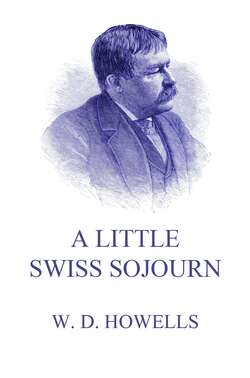Читать книгу A Little Swiss Sojourn - William Dean Howells - Страница 10
VII
ОглавлениеWhenever it came out, or rather whenever the rain stopped, we pursued our explorations of the neighborhood. It had many interesting features, among which was the large Hôtel Byron, very attractive and almost empty, which we passed every day on our way to the post-office in Villeneuve, and noted two pretty American shes in eye-glasses playing croquet amid the wet shrubbery, as resolutely cheerful and as young-manless as if they had been in some mountain resort of our own. In the other direction there were simple villas dropped along the little levels and ledges, and vineyards that crept to the road's edge everywhere. There was also a cement factory, busy and prosperous; and to make us quite at home, a saw-mill. Above all, there was the Castle of Chillon; and one of the first Sundays after our arrival we descended the stone staircased steps of our gardened terrace, dripping with ivy and myrtle, and picked our steps over the muddy road to the old prison-fortress, where, in the ancient chapel of the Dukes of Savoy, we heard an excellent sermon from the pasteur of our parish. The castle was perhaps a bow-shot from our pension: I did not test the distance, having left my trusty cross-bow and cloth-yard shafts in Boston; but that is my confirmed guess. In point of time it is much more remote, for, as the reader need not be reminded, it was there, or some castle like it, almost from the beginning, or at least from the day when men first began to fight for the possession of the land. The lake-dwellers are imagined to have had some sort of stronghold there; and it is reasonably supposed that Romans, Franks, and Burgundians had each fortified the rock. Count Wala, cousin of Charlemagne, and grandson of Charles Martel, was a prisoner in its dungeon in 830 for uttering some words too true for an age unaccustomed to the perpetual veracity of our newspapers. Count Wala, who was also an abbot, had the misfortune to speak of Judith of Bavaria as "the adulterous woman," and when her husband, Louis le Debonair, came back to the throne after the conspiracy of his sons, the lady naturally wanted Wala killed; but Louis compromised by throwing him into the rock of Chillon. This is what Wala's friends say: others say that he was one of the conspirators against Louis. At any rate, he was the first great captive of Chillon, which was a political prison as long as political prisoners were needed in Switzerland. That is now a good while ago.
Chillon fell to the princes of the house of Savoy in 1033, and Count Peter, whom they nicknamed Little Charlemagne for his prowess and his conquests, built the present castle, after which the barons of the Pays de Vaud and the Duke of Cophingen (whoever he may have been) besieged Peter in it. Perhaps they might have taken him. But the wine was so good, and the pretty girls of the country were so fond of dancing! They forgot themselves in these delights. All at once Little Charlemagne was upon them. He leaves his force at Chillon, and goes by night to spy out the enemy at Villeneuve, returning at dawn to his people. He came back very gayly; when they saw him so joyous, "What news?" they asked. "Fine and good," he answers; "for, by God's help, if you will behave yourselves well, the enemy is ours." To which they cried with one voice, "Seigneur, you have but to command." They fell upon the barons and the duke, and killed a gratifying number of their followers, carrying the rest back to Chillon, where Peter "used them not as prisoners, but feasted them honorably. Much was the spoil and great the booty."
Afterwards Peter lost the castle, and in retaking it he launched fifty thousand shafts and arrows against it. "The castle was not then an isolated point of rock as we now see it, but formed part of a group of defences."
